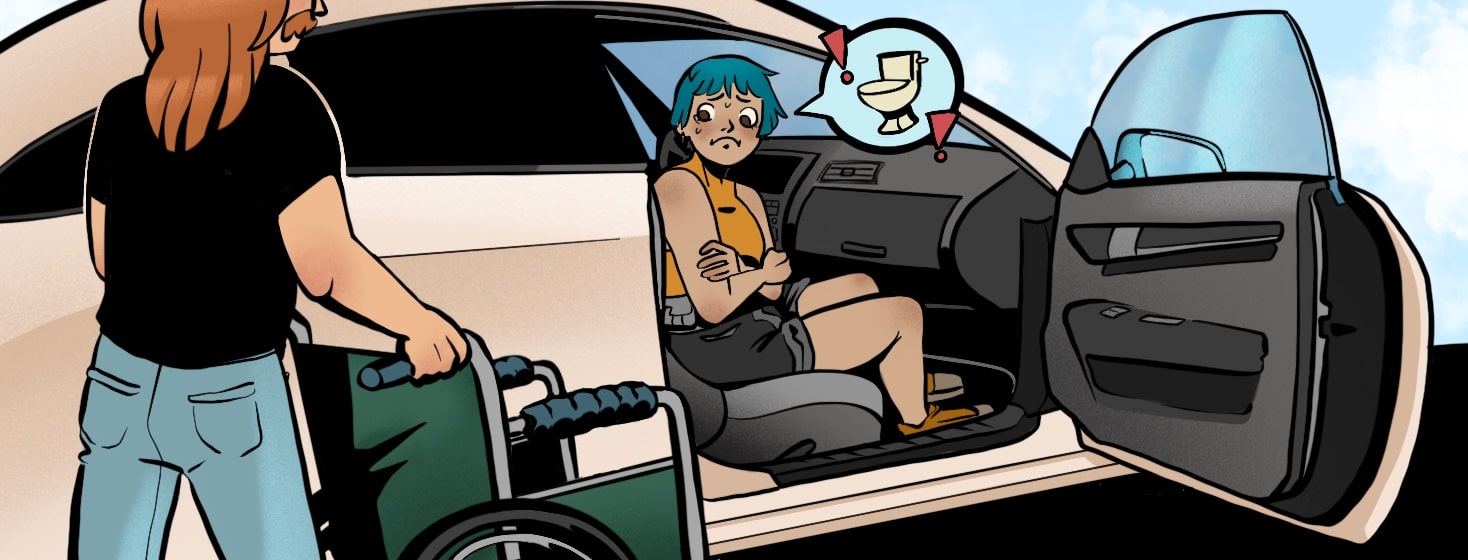Traveling as an Ambulatory Wheelchair User with IBS
In recent years, my challenges have changed. I am now in an ambulatory wheelchair. Since this change, I have not traveled. Everything was a big adjustment, and, quite honestly, I could not travel when everything seemed too physically and mentally difficult.
After over 3 years of learning to live differently, I finally embarked on a journey that would have been ambitious even before the big changes. This trip covered 11 states in 7 days, and that’s a lot of miles and time in a vehicle. I was terrified of how it would all go. Traveling with IBS is already difficult. How much worse would it be when adding in mobility issues?
Shifting IBS types during travel
I have IBS-M, so I have mixed episodes. Having episodes of IBS-C and IBS-D makes it even more difficult to predict IBS flares. My symptoms can change quickly and could be extreme. When I left home, I was in the midst of an IBS-C flare. I hoped it would resolve itself without flipping to the opposite extreme.
A possible flip in episodes could be disastrous. It would require fasting or enough antidiarrheal medication to throw me into IBS-C. Neither type is preferable, although I will admit it is much different dealing with the two types while traveling. IBS-D can cause incontinence if you cannot relieve yourself in a hurry. IBS-C is less messy.
Cautiously optimistic about changing IBS flares
Being optimistic about it but still erring on the side of caution, I decided to fast throughout the day and only eat when we stopped for the night. I knew I would need to hunt down a restroom if I needed one, and even when I found one, I would be unable to run. Fasting was my only defense against accidents.
Fasting created its own set of challenges. I also limited my fluid intake because I knew I would have difficulty getting to the bathroom regularly. Not only did I find it difficult to wait all day to eat, but not drinking enough fluids led to dehydration. I became even more tired. I found it hard to strike a balance, and I spent days struggling to keep going at a pace that would be fast, even for people without my issues.
Finding an accessible bathroom when traveling
Traveling with IBS without a mobility issue is difficult. I knew adding a mobility issue would make it even worse. Since I am in a wheelchair most of the time when I am out and about, it is much easier to use a family bathroom to have assistance. Unfortunately, these are hard to find.
Finding an accessible bathroom is another challenge. One chain of department stores tends to have a family bathroom in every store. Of course, there isn’t one of these stores on every corner. It may be an hour or more between stores, making it even harder to rely on finding one in time if I am in the midst of a flare.
Consequences of extreme measures to avoid IBS flares
Traveling in my condition was difficult. I fasted and avoided drinking any fluids for many hours each day. While this was effective at preventing accidents, it caused other health issues. It added to my fatigue and led to dehydration. I do not recommend doing what I did. This was not a solution. It was a bad idea from the start, and I am still dealing with the consequences days after returning.
I took Bentyl to help with cramping and to stop and try to prevent more IBS-D flares. It worked but not without consequences. Thanks to my actions, I am not struggling with an IBS-C flare. I was fortunate not to have an accident during my trip, but what I did was reckless and a terrible idea. Do not do what I did.
Travel with IBS and mobility issues
I am still learning how to strike a balance, and I should not have done what I did. Learning to adjust to mobility issues is difficult, and I am still trying to figure out how to handle it all. IBS is difficult all on its own but being unable to run to a restroom when needed makes it all so much worse.
Having to wait for someone to get my wheelchair out of a vehicle and getting into it takes time. Finding a bathroom was always a challenge on a road trip, but finding an accessible bathroom makes it even more challenging. I know I have to find a better solution before my next trip.
Do you have mobility issues? How do you deal with IBS and mobility issues when traveling? I could use some help to figure out how to best handle these combined challenges, so I would love to hear about your experience.

Join the conversation